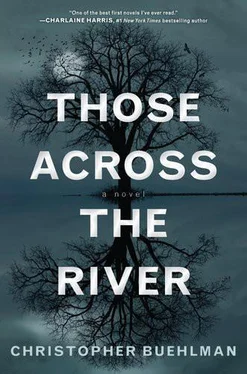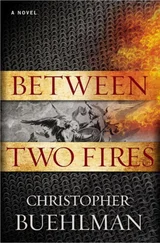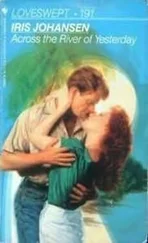He grunted.
“The other students would appreciate it, too. She’s so good at math she helps the others solve problems. Sarah really has a gift. She could be anything she wanted, a doctor, a journalist. She would have a good chance at winning a scholarship if you wanted to send her off to a women’s college…”
“Now, just hold on. I ain’t sendin her to no damn college while the other kids walk aroun bare of foot. They out back in the rain right now stickin their feet in the mud gettin ground itch is how much sense they got. We ain’t for college, and college ain’t for us. Besides which, I don’t know if you got your head out a your books to see, but we got bad news aroun here. Niggers is killin our kids. Comin right up an killin em on they own land. Now, I ain’t no cripple an I ain’t no woman an I ain’t no Yankee”—he looked at me for that—“and I ain’t scared to shoot the head off nobody comin aroun if I don’t know em. Sarah’s watched over here. Don’t seem she’s so watched over at that school with jus you, or gettin there, or comin back.”
“I understand your concern. But I promise you I won’t let anything happen to her. Or anyone get to her. They’d have to go through me first.”
That struck him as funny and he laughed in a gravelly little chuckle. It was the first appealing thing I had seen this man do.
“I know,” Dora said, “there’s not much of me to go through.”
“No, you ain’t much,” he agreed, still chuckling.
Everybody was quiet for a while, letting the rain do the talking, until at last Mr. Woodruff said, “Alright, damnit, you women gonna worry at me like a tick. Go on back, Sarah. But you, you gonna keep her outta trouble, you hear? I got your word?”
“Yes.”
“I do, now. I got your word.”
We stood up to leave, and I saw that I would be the one opening the door.
“Thanks for the hospitality,” I said, tipping my hat, for which Dora elbowed me soundly in the ribs once we were back outside in the warm rain.
THE PEOPLE OF Whitbrow wouldn’t have to wait long to find out why Estel’s shovels had been stolen.
I heard the knock coming from the front door downstairs and I knew it was bad news. Bad news knocks hard. I swung my feet over the edge of the bed, still blinking in the sunlight, and checked the clock. Almost nine thirty. “I’m coming!” I yelled, and I jerked on some pants and went down. When I opened the door I saw Saul Gordeau panting and sweating so it was clear the boy had been running.
“Been knockin for a while. You okay?”
“I’m fine.”
“Sheriff wants all able-body men to go to the schoolhouse, Mr. Nichols.”
“My wife, is she alright? What’s happened?”
“She ain’t hurt or nothin, but you best go to her. She’s there, too. Bring workin clothes. I got to tell Mr. Noble.”
And he ran off.
For just two or three seconds, watching the soles of the boy’s shoes flash as he sprinted to the next house, I was abundantly grateful not to know what it was about.
I FOUND EUDORA sitting under the maple tree outside the schoolhouse. I went straight to her without stopping to talk to any of the others gathered there. No other women were being let as near the scene as she was, but she had already been inside so nobody insisted when she refused to be moved farther off. She just sat there holding a leafy branch like it was the only thing that could protect her.
Crows were cawing loudly all around. One walked around near us, quite fearless, looking like a tiny Burgermeister in black velvet pants. I offered her a hand to help her stand, but she shook her head, trying to smile though her face was puffy and red from crying and her eyes were too wide.
“I can’t move just yet, Frankie, okay? I just need to sit here until I have enough strength in my legs to get up and then I’ll help. I’ll help, I swear, just not yet, okay?”
“Shhh,” I said. “You don’t have to do anything. Shhh.”
I squatted down and held her head against my chest while she reached her shaking hands up to touch my arms. I held her head against me and kissed the top of it for a long moment and then I allowed myself to look up at what was happening.
People had war faces on.
Everything seemed tilted.
The men of Whitbrow had their sleeves rolled up and shirts tied around their faces so they could breathe while they hauled them out. More men were coming, saying “Jesus” and “Lord” and “I just don’t believe this,” and after each man said these things, he would roll up his sleeves, too, and find something to put over his face.
I put my shirt up over my nose without knowing why, but when I peeked in I was glad for the shirt, even though it wasn’t enough. Tyson was there in the schoolhouse. What little there was of him. Raw and picked-over. Crows on him.
He was not alone.
Paul Miller was there, too. Bloated. Wormy. Coming out of his suit. There were others.
It was hard not to be sick.
Someone had exhumed the dead of Whitbrow and tied them sitting upright to the chairs behind the tables. Twenty of them. Some of them recent, some very old; the parts of these that would not bend had been broken off and placed beneath the chairs.
Dora had seen this, and past the shock I felt a shiver of rage that someone had left this for her to see. She told me later that she fought a small battle with the crows to get them out. She had done this with a branch she pulled from a young tree outside. It had not been easy to convince the crows to leave that room of plenty, but she managed better after she broke one’s wing and then killed it.
It was then that she saw the writing. I looked up now and saw it. It was on the front wall behind where she stood to teach. It had been written in dark, moist earth above the blackboard. Like a lesson for a dead class.
SEND THE PIGS
I steadied myself on the desk and saw the muddy footprints on the ground. People had done this in their bare feet. Men, but also at least one woman or larger child.
This was so deliberate, and so deranged. I was mad. I used my anger to push myself off the desk, roll up my sleeves and get to work. There would be an awful lot of work for the dozen or so who had answered Estel’s call on blind faith. There was the removal of the dead. There was the placing of them in their boxes; these had been found stacked in a copse of trees not far away. There was the hauling of the dead back out to the cemetery. There was the sorting out of which bodies went in which holes; many of the older ones had to be guessed at. There was the shoveling under. Last came the cleaning of the classroom.
Many of those who helped got sick, but most continued even though their heads were light and their stomachs bounced. Pastor Lyndon did not speak as he worked. He became ill when, in the close heat of the classroom, the arm of a woman who was buried in 1910 came off in his grip and she fell.
“This is just the shell,” I heard him mutter to himself. “She has gone home to glory and left the husk behind. This is not her, it is not. She is with God and she sings.”
He had to run outside then, but he came back. Most of those who had to run outside came back, although a few did not. Pastor Lyndon worked as hard as any of us. When we got the dead back to the cemetery, some of my fellow townsmen looked as if they were waiting for the good reverend to speak. When we put the last one beneath the marker and tamped the earth down, many were no doubt hoping Pastor Lyndon would give them some words to seal the matter. To tell them it was done and they had done good work and they should endeavor to keep their faith while God tried them. Since he did not, but only wiped the grime from his brow like the rest of them and sat down among them, some closed their eyes, and I have to wonder if they were making up his words for themselves, perhaps something about the Philistines or the false prophets or the trials of Job.
Читать дальше












